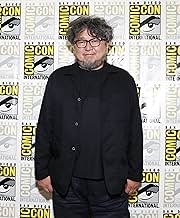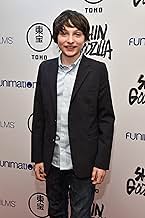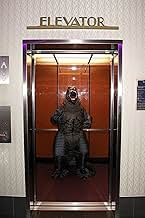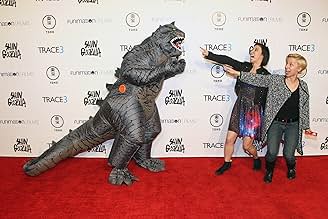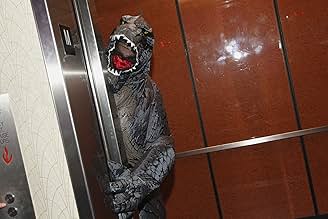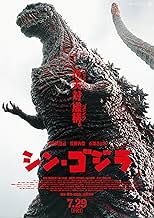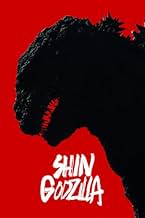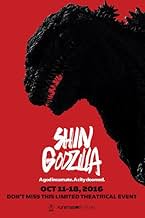Após um acidente na baía de Tóquio, uma criatura gigante chamada Godzilla aterroriza todo o Japão.Após um acidente na baía de Tóquio, uma criatura gigante chamada Godzilla aterroriza todo o Japão.Após um acidente na baía de Tóquio, uma criatura gigante chamada Godzilla aterroriza todo o Japão.
- Direção
- Roteiristas
- Artistas
- Prêmios
- 13 vitórias e 10 indicações no total
- Direção
- Roteiristas
- Elenco e equipe completos
- Produção, bilheteria e muito mais no IMDbPro
Avaliações em destaque
This is an excellent show that differs from the standard hack-and- slash and action-driven natures of other recent films (Independence Day 2 etc.). It is one of the most narrative-driven films that I've watched in the last 2 years.
PROS:
CONS
CONCLUSION:
PROS:
- The acting was great as a whole, comprising of much seriousness and focus, typical of the exigency of a nation-wide disaster, in the top politicians of the diet.
- It is full of political irony, satire of the Japanese government's and bureaucracy's indecision and red-taping. There is great intelligence imbued into movie, and it shows that much research has been done prior to filming. It also shows the way in which foreign and indigenous affairs have been interwoven together in governmental decision-making. I greatly appreciate this as a whole, as the narration is full of meaning and subtlety.
- The special effects of Godzilla were absolutely wonderful, portraying both scale and grandeur in Godzilla's size and style. I greatly enjoyed the four main scenes where Godzilla made its appearance, especially its climax at the latter two.
- The pacing was fast-paced, and little time was wasted. A lot of content had been packaged into a duration of just 120 minutes. While watching, I thought that the film lasted for 4 hours, as there were so many occurrences!
- The style and pace also remains true to the original Godzilla classics. So is the provenance of Godzilla.
CONS
- Ishihara would not have fooled us into thinking that she is a Japanese-American English speaker!
- Overall, it is very dialogue-heavy. This is both a strength and weakness. A strength as there is much character development, but also excessive to the point that it sometimes can be dreary and draggy. This is the greatest setback of the film, and could have been further streamlined. Minus 1 star for this.
CONCLUSION:
- As a whole, I rate it 9 out of 10, and will watch it again.
- Most people who have an appreciation for subtlety and nuance, and also of vivid storytelling will like this film.
- However, those who prefer a CGI roller-coaster like Independence Day 2 or 2012 may be turned off by the extremely heavy dialogue.
Japan is back in the game with their very own new Godzilla movie SHIN GOJIRA. Where Hollywood revived Godzilla as a tribute to his more heroic role in the late-showa era "versus" movies and the Heisei era, Toho Japan has gone back to the roots of the 1954 original Gojira and crafted a modern thriller about the horrors of mankind's misdeeds, the inaction of a government embroiled in bureaucracy and the impotence of a military in the face of this fiercer, meaner, force of nature Godzilla. .
SHIN GODZILLA is likely the first Godzilla movie to focus squarely on the political scene within the government when a giant monster attacks. Past movies have always involved Scientists, soldiers, or civilians focusing on the chaos on the ground. This movies looks into the chaos at the top as we follow young civil servant Yaguchi, deputy chief cabinet secretary (the first in a long list of designations to come).
A regular day in the government is interrupted by the collapse of the Tokyo bay aqua line tunnel and mysterious attacks off the coast of Japan. While the aged officials hold fruitless meeting after meeting in an obvious parody of real life bureaucratic process, Yaguchi theorists that the disasters are caused by a living creature.
No sooner is his theory shot down than an enormous tail rises out of the water. As the government scrambles but always falling a step behind the escalating disaster, Yaguchi forms a task force of unorthodox civilian experts to figure out how to stop this creature.
As the government's tried and tested efforts become increasingly futile, USA sends a special envoy Kayako Ann Patterson with the promise of military aid and insider knowledge to this mysterious creature dubbed "Godzilla".
The creature is growing, mutating, and taking on increasingly dangerous characteristics. Yaguchi's team is forced to think outside the box for a new way to halt its rampage before the UN deploys nuclear weapons on Japanese soil.
Contrary to the trailers, this is not the dark depressing disaster movie that was promised. Instead we are treated to one of the smartest and most biting social and political satires in modern cinema. Right in the crosshairs is the inefficient bureaucratic processes of the government and their obsession with trivial minutia which results in a complete mishandling of the crisis posed by the constantly evolving Godzilla.
The satire comes in the fact that the film does not overly dramatize anything; what you see is as close to reality as one can get in an old fashion parliamentary government like Japan's. Each ministry out for itself, passing the buck wherever possible, defending only their own interests. Standard procedures take precedence over unconventional methods.
Scenes of the prime minister making an announcement of Godzilla not being able to come ashore, intercut with the revelation that not only has the creature made landfall but has started trashing the town, hearkened back to the perceived mishandling of past real life disasters in Japan.
Yet the message underlying this movie is not a strict criticism of the government but an affirming call to action aimed at a new generation of leaders to unite a nation. Where the traditional methods fail, innovation and initiative will be the true weapons of the future. Yaguchi and his team represent this perfectly; outcasts from their respective fields because of their unconventional ideas.
Their tenacity in the face of hopeless defeat soon inspires fellow citizens from all walks of life, engineers, mechanics, construction workers and other blue collar roles typically overlooked by a status obsessed people, to come together and stand against a God incarnate.
The titular monster is unlike any incarnation ever seen. It's keloid looking skin, seemingly torn in places, gives the impression of pure suffering. Yet his inhuman all staring eyes betray a being devoid of soul. It is as it was back in 1954; a soulless unstoppable force birthed from mankind's sins. The military is powerless, though not for a lack of trying.
Where previous Godzilla movies have shown the military in a less than flattering light (cowardly, incompetent, or unable to hit such a massive creature), SHIN GODZILLA shows a military force truly giving their all, only hampered by slow indecision from the top.
The special effects used to bring this colossus to life is arguably good. No where near Hollywood blockbusters but amazing once you consider the comparatively tiny budget Toho had to work with. The naturalistic direction an camera-work courtesy of Evangelion creator Hideki Anno and his crew give the movie an almost "documentary" type feel.
It is devoid of filters, using very natural looking lighting wherever possible, which enhances the realism of the events taking place. Though the cuts can be a bit distracting at times, alternating between rapid fire jump cuts to scenes that look as if Anno left his camera running and forgot about it. Equally distracting is some of CGI compositing on Godzilla and some of his movements which end up more jerky than a puppet's. These are just minor faults though and only an issue to the more OCD of viewers.
Perhaps the only thing it does lack is the element of human drama. It is unafraid to show the horrible consequences of a monster's rampage through a macro view of a country's key decision makers but in doing so it does not leave opportunity to get the audience invested in any particular character.
More than just a monster movie, SHIN GODZILLA is a smart political thriller that satirizes an inflexible system. Those expecting a brainless action blockbuster will no doubt be disappointed. But as long as one is willing to turn in the brain and appreciate this movie for the deeper more complex themes it tries to tackle, you will find a refreshingly novel giant monster movie which the industry definitely needs.
SHIN GODZILLA is likely the first Godzilla movie to focus squarely on the political scene within the government when a giant monster attacks. Past movies have always involved Scientists, soldiers, or civilians focusing on the chaos on the ground. This movies looks into the chaos at the top as we follow young civil servant Yaguchi, deputy chief cabinet secretary (the first in a long list of designations to come).
A regular day in the government is interrupted by the collapse of the Tokyo bay aqua line tunnel and mysterious attacks off the coast of Japan. While the aged officials hold fruitless meeting after meeting in an obvious parody of real life bureaucratic process, Yaguchi theorists that the disasters are caused by a living creature.
No sooner is his theory shot down than an enormous tail rises out of the water. As the government scrambles but always falling a step behind the escalating disaster, Yaguchi forms a task force of unorthodox civilian experts to figure out how to stop this creature.
As the government's tried and tested efforts become increasingly futile, USA sends a special envoy Kayako Ann Patterson with the promise of military aid and insider knowledge to this mysterious creature dubbed "Godzilla".
The creature is growing, mutating, and taking on increasingly dangerous characteristics. Yaguchi's team is forced to think outside the box for a new way to halt its rampage before the UN deploys nuclear weapons on Japanese soil.
Contrary to the trailers, this is not the dark depressing disaster movie that was promised. Instead we are treated to one of the smartest and most biting social and political satires in modern cinema. Right in the crosshairs is the inefficient bureaucratic processes of the government and their obsession with trivial minutia which results in a complete mishandling of the crisis posed by the constantly evolving Godzilla.
The satire comes in the fact that the film does not overly dramatize anything; what you see is as close to reality as one can get in an old fashion parliamentary government like Japan's. Each ministry out for itself, passing the buck wherever possible, defending only their own interests. Standard procedures take precedence over unconventional methods.
Scenes of the prime minister making an announcement of Godzilla not being able to come ashore, intercut with the revelation that not only has the creature made landfall but has started trashing the town, hearkened back to the perceived mishandling of past real life disasters in Japan.
Yet the message underlying this movie is not a strict criticism of the government but an affirming call to action aimed at a new generation of leaders to unite a nation. Where the traditional methods fail, innovation and initiative will be the true weapons of the future. Yaguchi and his team represent this perfectly; outcasts from their respective fields because of their unconventional ideas.
Their tenacity in the face of hopeless defeat soon inspires fellow citizens from all walks of life, engineers, mechanics, construction workers and other blue collar roles typically overlooked by a status obsessed people, to come together and stand against a God incarnate.
The titular monster is unlike any incarnation ever seen. It's keloid looking skin, seemingly torn in places, gives the impression of pure suffering. Yet his inhuman all staring eyes betray a being devoid of soul. It is as it was back in 1954; a soulless unstoppable force birthed from mankind's sins. The military is powerless, though not for a lack of trying.
Where previous Godzilla movies have shown the military in a less than flattering light (cowardly, incompetent, or unable to hit such a massive creature), SHIN GODZILLA shows a military force truly giving their all, only hampered by slow indecision from the top.
The special effects used to bring this colossus to life is arguably good. No where near Hollywood blockbusters but amazing once you consider the comparatively tiny budget Toho had to work with. The naturalistic direction an camera-work courtesy of Evangelion creator Hideki Anno and his crew give the movie an almost "documentary" type feel.
It is devoid of filters, using very natural looking lighting wherever possible, which enhances the realism of the events taking place. Though the cuts can be a bit distracting at times, alternating between rapid fire jump cuts to scenes that look as if Anno left his camera running and forgot about it. Equally distracting is some of CGI compositing on Godzilla and some of his movements which end up more jerky than a puppet's. These are just minor faults though and only an issue to the more OCD of viewers.
Perhaps the only thing it does lack is the element of human drama. It is unafraid to show the horrible consequences of a monster's rampage through a macro view of a country's key decision makers but in doing so it does not leave opportunity to get the audience invested in any particular character.
More than just a monster movie, SHIN GODZILLA is a smart political thriller that satirizes an inflexible system. Those expecting a brainless action blockbuster will no doubt be disappointed. But as long as one is willing to turn in the brain and appreciate this movie for the deeper more complex themes it tries to tackle, you will find a refreshingly novel giant monster movie which the industry definitely needs.
After waiting for a whole year, I finally got my hands on the award-winning Japanese film "Shin Godzilla", directed by Hideaki Anno (Evangelion) and Shinji Higuchi (live action Attack On Titan). With the praise this film got, did it live up to the hype for me? Yes and to an extent no.
The film is a modern-day remake, showing how would the Japanese government (and to an extent other governments) react if Godzilla showed up for the first time today. This film is one of the more politically-charged entries in the franchise and is more of a thriller than a straight-up monster movie. There are lots of characters, a majority of which don't have much personality, but the main ones like protagonist Rando I found myself latching on to. Some the best scenes are when the characters stop acting like politicians and have casual and occasionally humorous dialogue. At least they took the whole situation very seriously with rarely an over-the-top moment much like the 2014 film, a breath of fresh air within the franchise. There's also this mystery element that plays a huge part in the story which I liked very much. Just as the 1954 film was a metaphor for Hiroshima and Nagasaki, this one reflects the Fukushima meltdown as well as the tsunami and earthquake Japan suffered a few years back (goes to show that Godzilla will always find a way to stay relevant).
How does Big G himself hold up? Pretty good. His design is more-or-less an update of his original 1954 look, his skin looking like radiation scars. New to the series is that Godzilla EVOLVES throughout, starting out smaller and very odd-looking but growing larger, more powerful, and even smarter as the story progresses, making him unpredictable. I also enjoyed the exploration of his biology, that is how this creature could exist. My complaints fall under a few things, strictly on his main form: his arms are too small and he isn't very expressive, mostly just lumbering along in a straight line. When he does gets mad, however, that's when he really shines. The action scenes are entertaining enough and there's plenty of destruction featured with some surprising moments here and there. The special effects are largely CGI with elements of practical effects, both of which are good; Big G isn't a man in a suit this time (kinda disappointing) but rather motion capture, though there are a few well-done miniatures. Some sound effects are of the old era and the music is a mix of the original's by Akira Ifukube with some new ones by Shiro Sagisu, a lovely combo. There's even a track from Evangelion (Decisive Battle).
My favorite scene: The first time Godzilla uses his atomic breath. Set at night with a mournful choir singing in the background (w/ English lyrics), the suspense that builds to the monster unleashing his power and rage upon the world was epic, chilling even, and has tremendous payoff. It's a truly apocalyptic image.
There are a few issues to address. I admit the pacing isn't the best. The beginning particularly has some rapid editing and there are texts on the screen throughout (often naming a character and political position) that are quite distracting and take getting used to, though I suppose you're supposed to feel as rushed as these politicians. Also, there's a huge gap before the climax where there's no action going on that I honestly think the filmmakers should have cut down a little. I like the characters and what's happening to them, but I would have preferred for the film to cut to the chase a bit.
Overall, this movie has its faults for sure, but I'm still glad I saw it. It was an interesting twist to my favorite fictional character. More films in both Japan and America are on the way and I can't wait. Long live the King of the Monsters!
The film is a modern-day remake, showing how would the Japanese government (and to an extent other governments) react if Godzilla showed up for the first time today. This film is one of the more politically-charged entries in the franchise and is more of a thriller than a straight-up monster movie. There are lots of characters, a majority of which don't have much personality, but the main ones like protagonist Rando I found myself latching on to. Some the best scenes are when the characters stop acting like politicians and have casual and occasionally humorous dialogue. At least they took the whole situation very seriously with rarely an over-the-top moment much like the 2014 film, a breath of fresh air within the franchise. There's also this mystery element that plays a huge part in the story which I liked very much. Just as the 1954 film was a metaphor for Hiroshima and Nagasaki, this one reflects the Fukushima meltdown as well as the tsunami and earthquake Japan suffered a few years back (goes to show that Godzilla will always find a way to stay relevant).
How does Big G himself hold up? Pretty good. His design is more-or-less an update of his original 1954 look, his skin looking like radiation scars. New to the series is that Godzilla EVOLVES throughout, starting out smaller and very odd-looking but growing larger, more powerful, and even smarter as the story progresses, making him unpredictable. I also enjoyed the exploration of his biology, that is how this creature could exist. My complaints fall under a few things, strictly on his main form: his arms are too small and he isn't very expressive, mostly just lumbering along in a straight line. When he does gets mad, however, that's when he really shines. The action scenes are entertaining enough and there's plenty of destruction featured with some surprising moments here and there. The special effects are largely CGI with elements of practical effects, both of which are good; Big G isn't a man in a suit this time (kinda disappointing) but rather motion capture, though there are a few well-done miniatures. Some sound effects are of the old era and the music is a mix of the original's by Akira Ifukube with some new ones by Shiro Sagisu, a lovely combo. There's even a track from Evangelion (Decisive Battle).
My favorite scene: The first time Godzilla uses his atomic breath. Set at night with a mournful choir singing in the background (w/ English lyrics), the suspense that builds to the monster unleashing his power and rage upon the world was epic, chilling even, and has tremendous payoff. It's a truly apocalyptic image.
There are a few issues to address. I admit the pacing isn't the best. The beginning particularly has some rapid editing and there are texts on the screen throughout (often naming a character and political position) that are quite distracting and take getting used to, though I suppose you're supposed to feel as rushed as these politicians. Also, there's a huge gap before the climax where there's no action going on that I honestly think the filmmakers should have cut down a little. I like the characters and what's happening to them, but I would have preferred for the film to cut to the chase a bit.
Overall, this movie has its faults for sure, but I'm still glad I saw it. It was an interesting twist to my favorite fictional character. More films in both Japan and America are on the way and I can't wait. Long live the King of the Monsters!
"Shin Godzilla" is a far departure from the usual Godzilla movie. With a darker tone and vastly different design of the titular monster, this movie isn't afraid to set itself aside from the more traditional monster movie, focusing more on the political side of things. While I at first thought this was unnecessary, it's important to note that this film was a representation of Japanese tragedies. Similar to how the original film was representative of the nuclear bombings of Japan, this film is representative of the Fukushima Daiichi nuclear disaster and the 2011 Tohoku earthquake, events heavily involved in political controversy. This isn't a perfect movie in any way, but I admire that bold steps it took to change. Honestly, probably one of the best Godzilla movies.
If you are expecting a stereotypical monster movie you will be disappointed. This film is definitely much more of a political thriller than a monster flick.
The movie is filled with plain and mostly forgettable characters, however, collectively they make the real protagonist of the film: Japan. The film critiques and parodies a dysfunctional bureaucracy, allowing for some not so subtle irony and other comedic moments using techniques such as extreme close-ups, quick changes in POV's, rapid-fire dialogue to reinforce these while still allowing for suspense when needed. Its overly fast pace is a bit jarring at times, making it hard to concentrate with its many fast and transitionless cuts.
Shin Godzilla feels very much like a documentary, with convincing this-is-really-happening atmosphere. The filmmakers really make you feel like a participant and witness to the events happening throughout the film engrossing you into the universe and adding a huge sense of realism which adds to the political side of the film and the impact of the destruction.
Godzilla himself is also amazing, the combination of puppeteering, animatronics and digital effects create such a unique portrayal of the monster evoking terror and intrigue. Though, the cgi isn't always perfect, but this can be overlooked.
The ending is also a mixed bag, it has a great message of collaboration and ends with an interesting introspection on who the bigger monster is: humanity or Godzilla. However it did feel too cheap and easy which kinda diminished the realistic tone set by the film.
The movie is definitely not perfect but its multi layered symbolism and message are so interesting I couldn't help but be invested throughout the whole thing.
The movie is filled with plain and mostly forgettable characters, however, collectively they make the real protagonist of the film: Japan. The film critiques and parodies a dysfunctional bureaucracy, allowing for some not so subtle irony and other comedic moments using techniques such as extreme close-ups, quick changes in POV's, rapid-fire dialogue to reinforce these while still allowing for suspense when needed. Its overly fast pace is a bit jarring at times, making it hard to concentrate with its many fast and transitionless cuts.
Shin Godzilla feels very much like a documentary, with convincing this-is-really-happening atmosphere. The filmmakers really make you feel like a participant and witness to the events happening throughout the film engrossing you into the universe and adding a huge sense of realism which adds to the political side of the film and the impact of the destruction.
Godzilla himself is also amazing, the combination of puppeteering, animatronics and digital effects create such a unique portrayal of the monster evoking terror and intrigue. Though, the cgi isn't always perfect, but this can be overlooked.
The ending is also a mixed bag, it has a great message of collaboration and ends with an interesting introspection on who the bigger monster is: humanity or Godzilla. However it did feel too cheap and easy which kinda diminished the realistic tone set by the film.
The movie is definitely not perfect but its multi layered symbolism and message are so interesting I couldn't help but be invested throughout the whole thing.
New Horror Releases in August 2025
New Horror Releases in August 2025
Together is in theaters, "Alien: Earth" is coming to TV, and Weapons is coming soon. Here's everything new in the world of horror this August.
Você sabia?
- CuriosidadesFor Satomi Ishihara, who plays a Japanese-American diplomat, the hardest part of her performance was learning English. She found out she was playing an American after being cast, and was shocked by the amount of the English dialogue she had to speak when she read the script.
- Erros de gravaçãoThe drug that the government uses to kill Godzilla is described as something that will "disable his internal cooling system". After the drug is used at the end, Godzilla freezes. If the drug was supposed to disable his internal cooling system, it would have overheated him, not frozen him. But it's a bit more complex than that... In fact, in the movie the drug actually does manage to disable Godzilla's cooling system, but in stead of overheating him this triggers a SCRAM-shutdown (=Safety Control Rods Activation Mechanism) as a kind of involuntarily overreaction-thus freezing him in the procedure. By freezing himself temporarily, Godzilla is able to survive this potentially critical trauma.
- Citações
Hiromi Ogashira, Deputy Director of Nature Conservation Bureau: Man is more frightening than Gojira.
- Cenas durante ou pós-créditosThe Toho logo appears as the 1950s color version to homage Godzilla (1954)'s era.
Godzilla's stomping and roar is heard, which also happened in Godzilla (1954).
- Trilhas sonorasPersecution of the Masses
Written by Shirô Sagisu
Lyrics by Mike Wyzgowski
Soprano vocals performed by Catherine Bott
Alto and Mezzo-Soprano vocals performed by Deborah Miles-Johnson
Tenor vocals performed by Andrew Busher
Bass vocals performed by Michael George
Orchestra by London Studio Orchestra
Principais escolhas
Faça login para avaliar e ver a lista de recomendações personalizadas
Detalhes
- Data de lançamento
- País de origem
- Centrais de atendimento oficiais
- Idiomas
- Também conhecido como
- Godzilla Resurgence
- Locações de filme
- Empresas de produção
- Consulte mais créditos da empresa na IMDbPro
Bilheteria
- Faturamento bruto nos EUA e Canadá
- US$ 5.262.882
- Fim de semana de estreia nos EUA e Canadá
- US$ 458.342
- 16 de out. de 2016
- Faturamento bruto mundial
- US$ 81.397.624
- Tempo de duração
- 2 h(120 min)
- Cor
- Proporção
- 2.39 : 1
Contribua para esta página
Sugerir uma alteração ou adicionar conteúdo ausente






